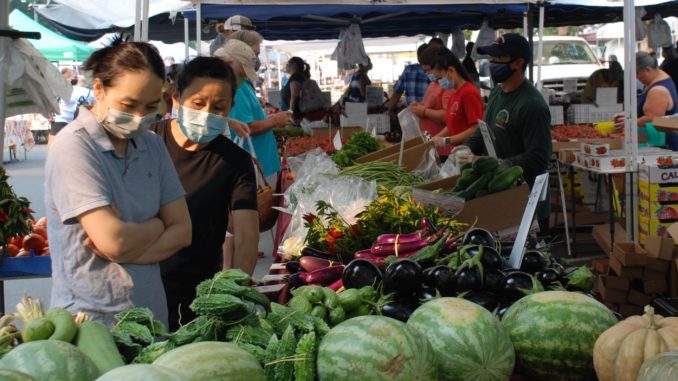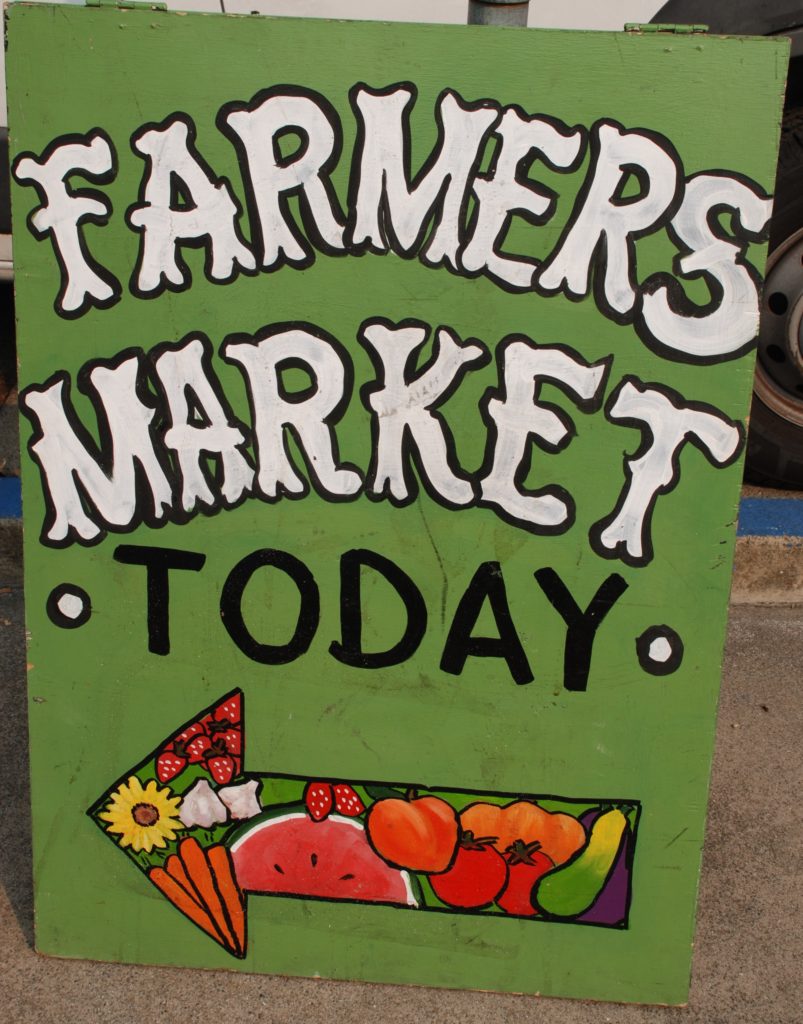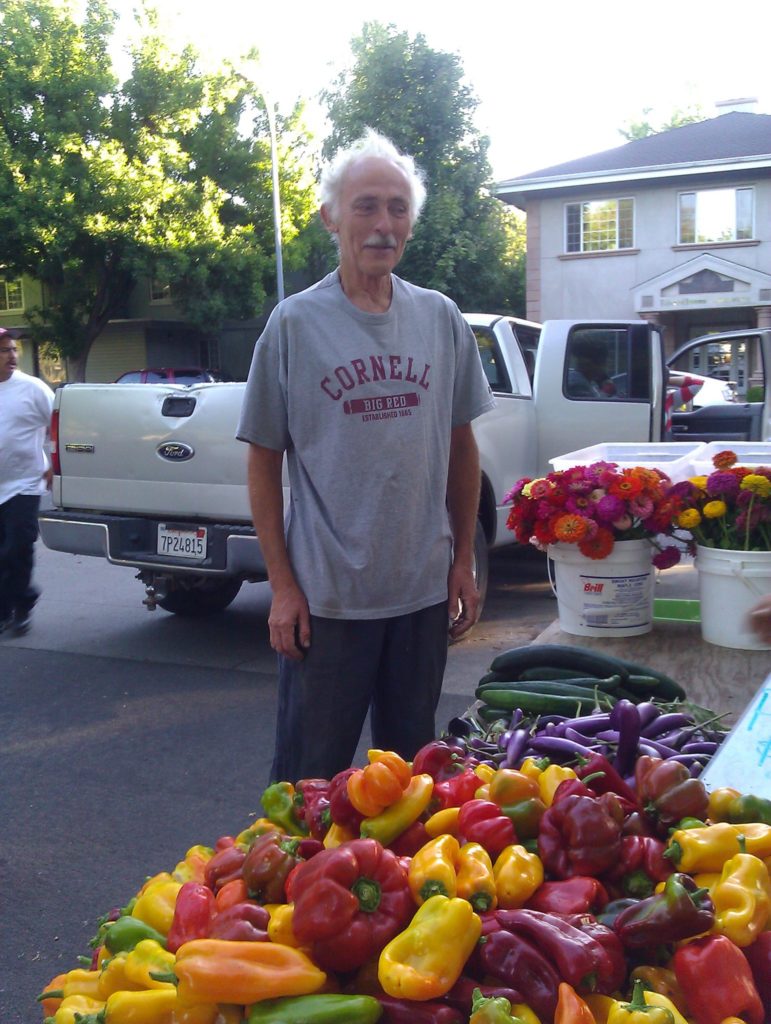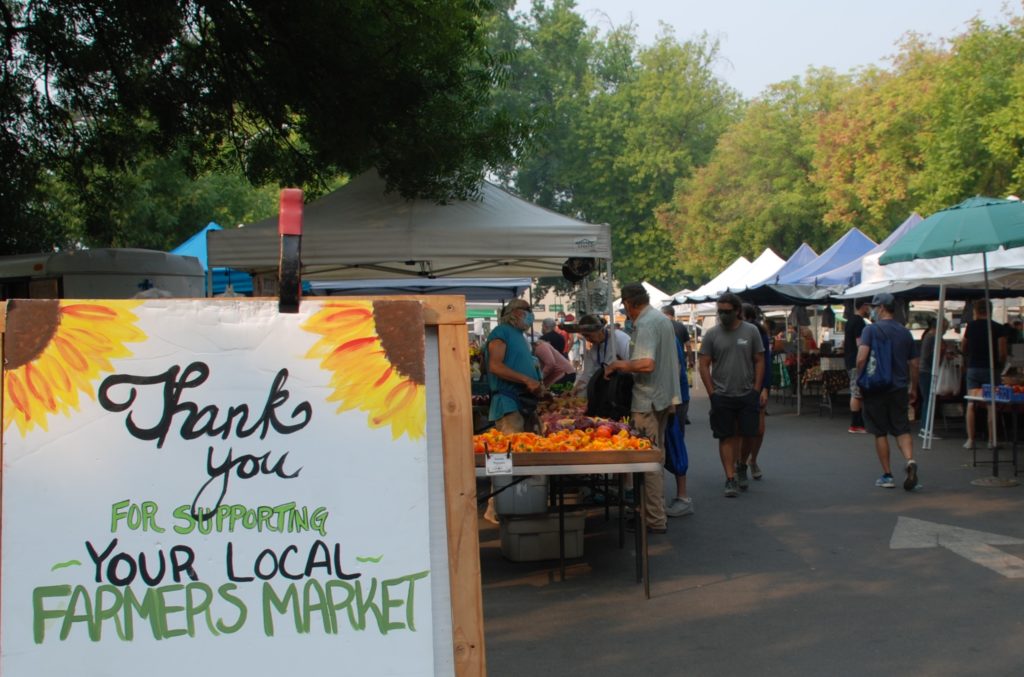
When Debbie Ariza reflects on the history of the Chico Certified Farmers Market, she comes back again and again to a theme befitting a farmer.
Growth.
Ariza, who owns and operated Debbie’s Farm in Capay, has been selling produce at the farmers market since 1983, its third year of existence. A dozen vendors, sometimes more depending on the season, gathered in the parking lot of the now-defunct Gold Country Supermarket at the corner of East Fifth and Orient streets. Ariza drove into town Saturday mornings, set up an umbrella and sold kiwifruit and squash—first out of her Dodge car, then a ’67 Chevy pickup.
In July, the Chico market turned 40 years old, and the popular Saturday market now encompasses the municipal lot at East Second and Wall streets, where it’s been a weekly fixture for 28 years. The Chico Certified Farmers Market organization, or CCFM, also operates a Wednesday market at the North Valley Plaza, where Ariza sells, and a Tuesday market in Paradise (see chicofarmersmarket.com for more information). CCFM was running a market in Oroville until the coronavirus pandemic impacted attendance.
Ariza now needs a three-quarter-ton truck for the array of fruits and vegetables she harvests off nearly 11 acres, converted in 1980 from an old almond orchard. For as long as she’s been making the 16-mile ride to Chico, Ariza has sold at farmers markets in Sacramento and Davis. There’s something special about Chico’s Saturday morning market.
“It’s local; you get to build up friendships and customer base, which keeps you coming back; and the market has grown as my farm [has],” Ariza said. “I also supply to the Orland School District with my kiwi and citrus, and the Thermalito School District, too—I like the market the best.”
She and other mainstays—such as Bruce Balgooyen of Farmelot, who’s sold at CCFM for 33 years and served on the organization’s board, and Richard Coon of Wookey Ranch, an 11-year vendor and current board chair—would have marked the market’s 40th anniversary with a harvest festival this fall. Coronavirus restrictions and the resultant damper on downtown preempted those plans.
Instead, they’re celebrating an increased sense of security in the form of a stable lease for their location. Last Tuesday (Aug. 25), the Chico City Council unanimously ratified a franchise agreement that runs for eight years with automatic annual renewals. The previous six-year lease would have expired Dec. 31; before that pact, CCFM came before the council annually to seek renewals, at meetings that often proved lengthy and contentious.
“It’s a really beneficial outcome,” Coon said of the agreement, adding it will “provide local food security and stability for the market—and take it out of the political arena, so to speak, as much as possible in Chico.”
Said Balgooyen: “It’s good to have that permanence.”
Gaining stability
On any given Saturday morning, even amid the pandemic, CCFM vendors and patrons flock to the downtown lot the market has called home since 1992. That vibrance belies how its 50 farmers, artisans and crafters have faced displacement multiple times over the past decade and a half.

City officials considered a parking structure for the present site in 2006. Eight years later, the City Council deadlocked on renewing CCFM’s lease, and the city considered relocating the market to the lot behind the municipal center on East Fourth and Flume—but an advocacy group, Friends of the Farmers’ Market, got over 9,000 signatures for a ballot initiative to keep the market where it is, and the council ultimately approved the six-year compact.
Current councilmember Karl Ory, mayor of Chico in the 1980s and re-elected to the council in 2016, led the initiative effort. He initially voted against the new agreement, asserting that voters rather than councilmembers needed to decide the matter, but ultimately joined his colleagues in the final approval voting.
“Certainly they’ve had stability the last six years, and I think most people can see the results of it,” Ory said. “It seems not so crowded, better use of space.
“I’m disappointed they haven’t taken the opportunity to put in improvements,” he added, citing a permanent bathroom with disability access and electrical hookups instead of gas generators—“I would like to see them do that kind of investment.” Per the agreement, CCFM’s payment to the city is $5,000 per year.
Even so, Ory expressed the importance of having the market downtown, calling it “a vibrant reflection of Chico.” He described travels to cities with farmers markets, including his family’s ancestral town in Sweden, and witnessing a similar sense of community being fostered. He also pointed to markets as entrepreneurial breeding grounds, mentioning Tin Roof Bakery as just one local business that got its start at CCFM.
Chico is known for its Thursday Night Market, too. Unlike the Saturday market, which run by its own organization composed of its vendors, the Downtown Chico Business Association puts on the Thursday event, which is as much a street fair as a market, with live entertainment along with food trucks and booths for myriad businesses and groups.
Balgooyen, who grows produce at Riparia in southwest Chico, said he tried selling at Thursday Night Market a handful of times but did 10 percent of the business he does Saturday mornings. He, like Ariza, has developed a loyal clientele at CCFM, where growers predominate and the market has grown into a weekly community ritual and a defining part of Chico’s identity.

“For the size of our community, ours does very well,” Balgooyen said. “It’s pretty easy, Saturday morning at 9 o’clock in the summer, to think, ‘Wow, everyone is shopping at the farmers market!’ The truth is most people don’t, they buy their produce and most other items in supermarkets—but Chico has the demographics so it can support a very vibrant market.”
New challenge
CCFM had hoped to commemorate its milestone with a community event. Then coronavirus quashed the plans. Coon said he tells his board that it looks like they’ll now have a to wait for a 41st anniversary celebration.
Still, he’s grateful they have reason to celebrate. Coon is in his 30th year raising livestock; he and his wife sell their meat via the Chico market. They chose CCFM at first because of proximity to their north Chico ranch, but as he got involved in the market’s leadership, he gained fresh insight and appreciation.
“The farmers and the artisans and the craftspeople of the market really have a say in how its run—that’s really unique,” Coon said. “It gives the [vendors] who make up CCFM a real sense of ownership and involvement. They’re passionate about their market.”
CCFM has three staff members, including a manager who started just three weeks ago, Tanner Hansen. They and the board have adapted operations to meet public health guidelines, such as increasing the space between vendors and requiring face coverings. CCFM also set up additional hand-washing stations.
“COVID affected us in ways we never could have imagined,” Coon said. “It’s been unexpected and a day-by-day source of concern, for all of us in the community really. A lot of our customers who come to the farmers market are extraordinarily grateful because they feel unsafe in a closed building, so a certain number of people have come to me directly and said thank you—because without the farmers market, they wouldn’t be doing a lot of shopping.”

Indeed, on a recent Saturday morning, attendees and vendors interacted with characteristic chatter, wearing masks or face shields.
The social aspect is important. Coon said the farmers market may well be the only community event at the moment. For growers such as Ariza, the market long has been her social outlet—with fellow growers and with customers.
“I’m kind of a loner a bit,” she said, “so that’s kind of a nice aspect, the friendships there.”
Balgooyen said the market provides an opportunity for Chicoans to connect with the source of their food—learn about the people who grow it and how its grown.
“People who don’t shop at farmers markets, they don’t know what they’re missing,” he said. “People only know what they’ve experienced. They see some of these wonderful varieties of lettuce that don’t make it to supermarkets, see all these varieties of heirlooms [tomatoes] … .
“There’s so much joy in buying your food from the farmer, getting to know about what he grows, what’s in season, what the qualities are. Come to the market and meet your farmer.”

Be the first to comment